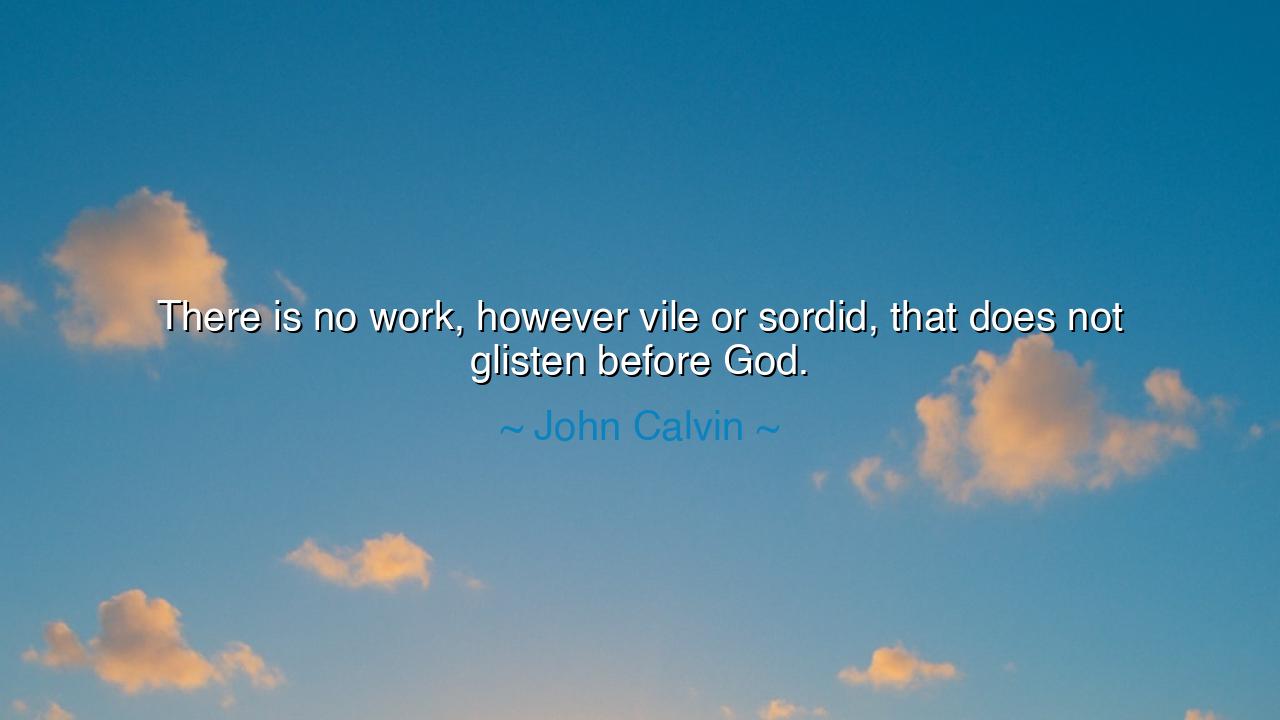
There is no work, however vile or sordid, that does not glisten






“There is no work, however vile or sordid, that does not glisten before God.” — These words of John Calvin shine like a hidden gem buried in the soil of human toil. They remind us that divinity is not found only in the cathedral or the scholar’s book, but in the sweat of the worker, the patience of the servant, and the quiet endurance of those whose labor is unseen. To glisten before God is not to be adorned by wealth or praised by men, but to have one’s work done in faith, in obedience, and in love. Calvin, the reformer of Geneva, understood this truth well: that the sacred is not separated from the ordinary, but breathes within it.
In the ancient days, men divided the world between holy and unholy, noble and base. But the eyes of Heaven see no such division. The Creator, who formed man from dust, did not despise the dust. He walked among fishermen, broke bread with tax collectors, and washed the feet of His own disciples. In this, the Eternal taught that every labor — if done in humility and purpose — becomes radiant. The cobbler who mends shoes, the mother who rocks her child, the farmer who tills the field — all these stand before God’s gaze, and their work glistens with unseen light.
Calvin’s words arose in a time when the world was awakening from the shadows of hierarchy. The idea that one’s calling could be sacred no matter how lowly it seemed was a new dawn. He declared that vocation itself — whatever it may be — is holy ground. The street sweeper, if he sweeps with faith, serves as greatly as the preacher who thunders from the pulpit. For in God’s kingdom, faithfulness outweighs grandeur, and devotion outshines reputation. The true measure of work is not its worldly value, but the spirit in which it is done.
Think of the humble Brother Lawrence, a seventeenth-century monk who worked in the kitchens of his monastery. Day after day, he scrubbed pots and cooked meals, yet he said, “I feel Jesus as near in the kitchen as I do before the altar.” His hands were rough, his tasks small, but his heart was aflame. To him, no act was vile, no motion meaningless. In peeling potatoes, he worshiped; in washing dishes, he prayed. And so, his lowly work glistened before God, shining brighter than many sermons that fell on deaf ears. His story endures because it reveals a truth that the proud often forget — that holiness can dwell in the most ordinary of motions.
This is the ancient secret: the divine spark rests not in the deed itself, but in the intention. When you labor in bitterness, even gold turns to ash. But when you labor in love, even ash turns to gold. The one who sweeps the floor with joy sanctifies it more than the one who builds temples in arrogance. The one who tends the sick, or bears burdens in silence, participates in the very work of God. To do one’s duty faithfully, no matter how small, is to weave light into the fabric of the world.
And what lesson shall we carry, children of dust and dawn? That there is no work too small, no service too plain, no effort too hidden to escape the sight of Heaven. The smallest act done with love is greater than the grandest deed done for pride. Do not despise your work, nor envy another’s. If you are given a task, do it well — for in the doing, you honor the One who gave it. Let every stroke of your hand, every thought of your heart, every word you speak, be offered as a flame upon the altar of your life.
Therefore, when you rise in the morning and your hands are weary, remember Calvin’s wisdom: your labor glistens before God. You are not unseen. The sweat upon your brow is holy water; the ache in your limbs is a hymn of creation. Whatever your craft — teach, build, heal, clean, write, or simply endure — do it with devotion, for in the eyes of eternity, there is no difference between the peasant and the prince. Only the light within the heart matters.
And when you have done your work, however small or unworthy it seems, lift your eyes heavenward and whisper, “It is Yours, Lord.” For in that moment, the invisible becomes visible, and your humble labor joins the eternal chorus — glistening before God like the morning star over the fields of time.






AAdministratorAdministrator
Welcome, honored guests. Please leave a comment, we will respond soon